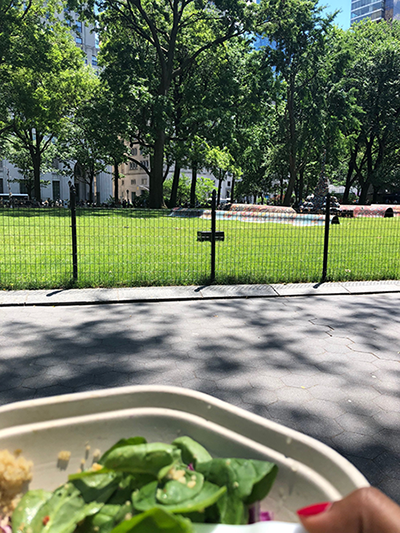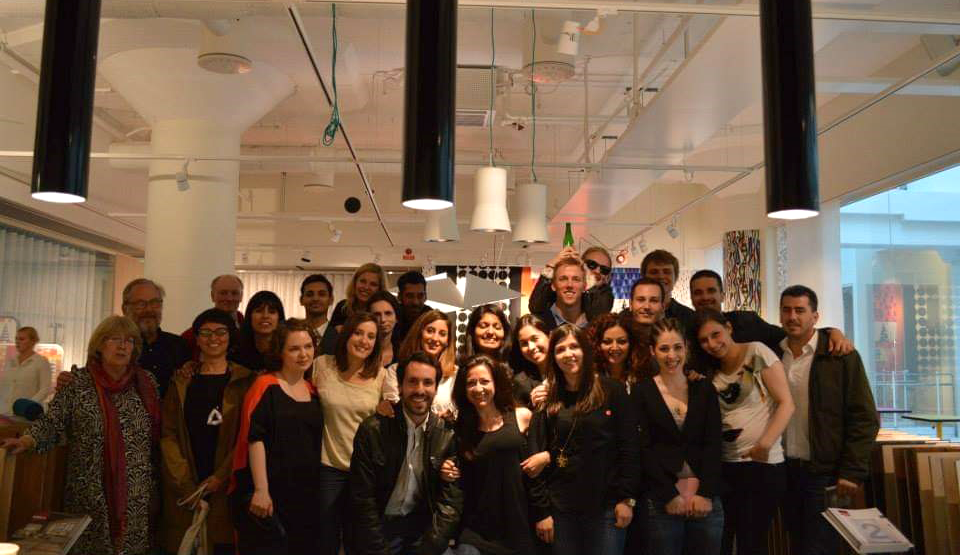Gayathri focuses on light and the effect it has on peoples health
Gayathri Unnikrishnan graduated from the master’s programme in Architectural Lighting Design in 2013. She is now based in New York City at the International WELL Building Institute.

Hi Gayathri, where are you working at the moment?
I am currently working at the International WELL Building Institute out of the Headquarters in New York City as the Concept Lead for Light and Director on the Standard Development team. I wear a couple of hats in this role- one of which is as the subject matter expert for Light for the company: I focus on the importance of light on health of people in buildings, translate existing research into implementable strategies and collaborate with industry thought leaders to create market transformation in the lighting industry. The other hat is my Director hat- I work on the evolution of the WELL Building Standard: this means collaborating with different departments as we work on projects and making sure we meet deadlines.
What can a regular day look like at your job?
Each day is different at my job depending on the day of the week and the projects I am working on, but this is what an ideal day can look like:
9.30 am: Arrive at office, grab a cup of coffee, greet colleagues, pet any dogs that are in office that day (we are a dog-friendly office).

9:45 am to 12pm: Focused work. This can include responding to emails, reviewing new research, project planning etc. My peak productive time is usually before lunch so I try to finish up as much of my tasks as possible during this time.
12 to 1pm: Lunch in the park. I try to take a mindful lunch break when I can and we are lucky to be working near Madison Square Park. When the weather is nice, it is really restorative to sit in the park, eat your lunch and watch the squirrels run around, while getting my light exposure for the day. When the weather is not great, I try to eat in the office kitchen with my colleagues.
1pm to 6 pm: Meetings and collaboration time. This is when I meet with my colleagues in and out of the office. The meetings can range from project check-ins, brainstorming sessions (my favourite kind of meeting) and calls with folks outside of the organisation. There are multiple coffee breaks within this time (coffee is my fuel) and when we can, we conduct "walking meetings" outside so we can get in some exercise, daylight and fresh air during the meetings.
6 to 6.30 pm: Head out of the office.
Have you worked with anything else since you graduated?
Yes and no. I have only worked in the lighting industry since I graduated, but I have worked in multiple roles and jobs. My first job after graduating from KTH was as the subject matter expert for a real estate company in Dubai. My responsibilities included building a lighting manufacturing vertical from scratch and providing technical expertise for their real estate projects. I then worked as an independent lighting consultant in India and Dubai before joining IWBI.
Why did you choose this programme at KTH?
After coming to a decision that I wanted to complete my master’s in Lighting Design, I realised that I wanted to experience a lighting environment that was different to what I was used to. Growing up in Dubai and spending my summer vacations in India, I was used to having a lot of daylight with little to no seasonal variation during the year. I identified Europe for completing my master’s because places there have long days during summer and long nights during winters. I was interested to see how the concept of light was approached in the region and experience the impact of daylight first hand.
I was very impressed by KTH's lighting programme and the topics covered. KTH has consistently been recognized as one of the top technical universities in the region and looked like a wonderful university to study at. Jan Ejhed, who is the founder of Department of the Architectural Lighting Design at KTH, is a well-known figure in the lighting industry, and I wanted to pursue the opportunity to learn from him.
I was also accepted for the Swedish Institute Scholarship for that year, and it covered the tuition and living costs- so the decision to join KTH was pretty much a no-brainer.
Are there any insights or knowledge you acquired during your studies that have been extra useful for you in your career?
So many, but I will cover the two most important ones here. The first was the importance given to the humans in the space. For every design proposal or project, our teachers asked us to think about the humans- the humans experiencing the place, the humans building the space and the humans maintaining the space. At the time, this thinking often made my projects really hard. We couldn't propose installing a beautiful giant light fixture in the lobby without thinking through how safe it would be to maintain it and what the experience of the people in and out of the space would be. However, this thinking helped me approach projects with a new perspective and has carried over to my work in my current role at IWBI.
The second lesson was developing collaboration and teamwork skills. We had several team projects and our class was very diverse in terms of education, experience and backgrounds. We learned to work together and use our specific expertise all while learning how to develop lighting solutions and building life-long friendships.
What were the best aspects of your studies at KTH?
My teachers and classmates, I must say. The teachers encouraged us to ask questions, approach issues from different angles and work together; they were kind and knowledgeable but they pushed us to find better solutions on our own. I was constantly being challenged and learning new things - from our teachers, from industry leaders who came to teach and from my classmates.
I also loved experiencing Swedish culture, whether it was the daily fika or the approach to gender equality. Having never experienced a real winter before, I learned first-hand what Seasonal Affective Disorder is and how much it can impact mental health.
What is your best memory from your time at the university?
This is a hard one! The best memory or at least the memory that is most representative of my time there is one of the project critique sessions. My teammates and I were really tense about this session since we were presenting our proposal for lighting a large building, for the first time, to our teachers. We went into the room. Our faculty was sitting around a table and there was a beautiful pie on the table. Rodrigo Muro, one of our teachers, pushed the pie toward us and said, "Have some! The fruits are from Jan's and Agneta's (Jan's wife) garden." I remember being so touched by the kind gesture as the faculty knew that the class was tensed about this project critique session. It did not mean that they softened their criticism or held back on their comments, but at least we were eating some tasty pie while hearing it. It taught me that empathy is necessary at all times but going an extra mile when you know a situation is going to be challenging will make all the difference.

I must say that partying with Nobel Prize winners at the Nobel NightCap was definitely a highlight as well!
What are your plans for the future?
For the foreseeable future, I would like to continue to do as much as I can to impact the health and well-being of people around the world, while creating awareness on the importance of light. Eventually, I would like to start teaching to create more awareness among students, so that the health of people are at the forefront of any projects that young professionals work on.
What would you want to say to a student thinking of applying for this programme?
Definitely join! KTH has a wonderful educational system, strong student community and very engaged faculty. You'll definitely learn a lot about electric light and daylight in the Architectural Lighting Design programme and you'll have the faculty supporting you and rooting for you every step of the way. The degree is a valuable addition to your resume as it is well-recognised and you'll learn life lessons while you achieve it. Academic lessons and life lessons? What more can you ask from a master’s programme?
